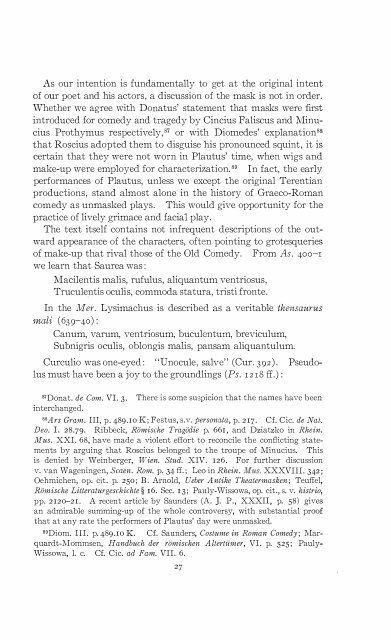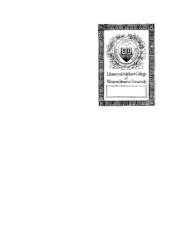Create successful ePaper yourself
Turn your PDF publications into a flip-book with our unique Google optimized e-Paper software.
As our intention is fundamentally to get at the original intent<br />
of our poet and his actors, a discussion of the mask is not in order.<br />
Whether we agree with Donatus' statement that masks were first<br />
introduced for comedy and tragedy by Cincius Faliscus and Minucius<br />
Prothymus respectively,87 or with Diomedes' explanation88<br />
that Roscius adopted them to disguise his pronounced squint, it is<br />
certain that they were not worn in Plautus' time, when wigs and<br />
make-up were employed for characterization. 89 In fact, the early<br />
performances of Plautus, unless we except the original Terentian<br />
productions, stand almost alone in the history of Graeco-Roman<br />
comedy as unmasked plays. This would give opportunity for the<br />
practice of lively grimace and facial play.<br />
The text itself contains not infrequent descriptions of the outward<br />
appearance of the characters, often pointing to grotesqueries<br />
of make-up that rival those of the Old Comedy. From As. 400-1<br />
we learn that Saurea was :<br />
Macilentis malis, rufulus, ali quantum ventriosus,<br />
Truculentis oculis, commoda statura, tristi fronte.<br />
In the Mer. Lysimachus is described as a veritable thensaurus<br />
mali (639-40) :<br />
Canum, varum, ventriosum, buculentum, breviculum,<br />
Subnigris oculis, oblongis malis, pansam aliquantulum.<br />
Curculio was one-eyed : "Unocule, salve" (CUf. 392). Pseudo<br />
Ius must have been a joy to the groundlings (Ps. 12 18 ff.) :<br />
87Donat. de Com. VI. 3. There is some suspicion that the names have been<br />
interchanged.<br />
88Ars Gram. III, p. 489.10 K ; Festus, s.v. personata, p. 217. Cf. Cic. de Nat.<br />
Deo. I. 28.79. Ribbeck, Romische Tragodie p. 661, and Dziatzko in Rhein.<br />
Mus. XXI. 68, have made a violent effort to reconcile the conflicting state<br />
ments by arguing that Roscius belonged to the troupe of Minucius. This<br />
is denied by Weinberger, Wien. Stud. XIV. 126. For further discussion<br />
v. van Wageningen, Scaen. Rom. p. 34 ff. ; Leo in Rhein. jl1 us. XXXVIII. 342 ;<br />
Oehmichen, op. cit. p. 250; B. Arnold, Ueber Antike Theatermasken ; Teuffel,<br />
Romische Litteraturgeschichte § 16. Sec. 13; Pauly-Wissowa, op. cit., s. v. histrio,<br />
pp. 2 120-21. A recent article by Saunders (A . J. P., XXXII, p. 58) gives<br />
an admirable summing-up of the whole controversy, with substantial proof<br />
that at any rate the performers of Plautus' day were unmasked.<br />
89Diom. III. p. 489.10 K. Cf. Saunders, Costume in Roman Comedy ; Mar<br />
quardt-Mommsen, Handbuch der romischen Altertiimer, VI. p. 525 ; Pauly<br />
Wissowa, 1. c. Cf. Cic. ad Fam. VII. 6.<br />
27
















